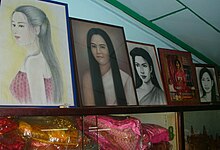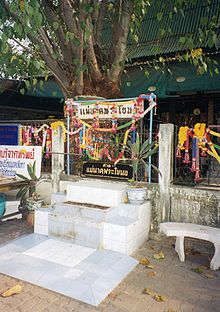Mae Nak Phra Khanong
 Mae Nak shrine offerings in the inner sanctum: Portraits of the spirit and folded dresses. | |
| Grouping | Legendary creature Tutelary deity |
|---|---|
| Sub grouping | Undead |
| Folklore | Thai folk mythology |
| Other name(s) | Mae Nak, Nang Nak |
| Country | Thailand |
| Region | Phra Khanong area, Bangkok |



Mae Nak Phra Khanong (Thai: แม่นากพระโขนง,[1] meaning 'Lady Nak of Phra Khanong'), or simply Mae Nak (Thai: แม่นาก, 'Lady Nak') or Nang Nak (Thai: นางนาก, 'Miss Nak'), is a well-known Thai ghost. According to local folklore the story is based on events that took place during the reign of King Rama IV.[2]
A shrine dedicated to Nak was constructed at Wat Mahabut. In 1997, the shrine was relocated to the nearby Suan Luang district of modern Bangkok.
Common legend
[edit]A beautiful young woman named Nak, who lived on the banks of the Phra Khanong canal, had an undying love for her husband, Mak.
While Nak was pregnant, Mak was conscripted into the Thai Army and sent to war where he was seriously wounded (in some versions it is the Kengtung Wars, while others are not specific). While he was being nursed back to health in central Bangkok, Nak and their child both died during childbirth. But when Mak returned home, he found his loving wife and child waiting for him. Neighbors warned him that he was living with a ghost but he rebuffed them.
One day, as Nak was preparing nam phrik, she dropped a lime off the porch. In her haste to retrieve it, she stretched her arm to an impossible length to pick it up from the ground below. Upon seeing this, Mak realized his wife was a ghost. That night, Mak sneaked out the house and fled with Nak in pursuit. According to Thai folklore, ghosts are afraid of sticky Blumea leaves so Mak hid behind a Blumea balsamifera (Thai: หนาด; pronounced nat) bush.[3] He then ran into Wat Mahabut temple, which as holy ground, a ghost cannot enter.
In her grief, Nak terrorized the people of Phra Khanong, furious at them for causing Mak to leave her. However, a powerful monk captured Nak's ghost; and after confining her in an earthen jar, threw it into the Phra Khanong canal.
There are regional variations to the rest of the story. In one, an old couple new to Phra Khanong find the jar while fishing; in another two fishermen dredge up the jar. In both cases, Nak is freed when the jar is opened.
In alternative versions, a venerable monk named Somdet Phra Phutthachan (To Phrommarangsi) defeats Nak by confining her spirit in the bone of her forehead and binds it to his waistband. Legend says the waistband is currently in the possession of the Thai royal family. Admiral Prince Abhakara Kiartivongse, Prince of Chumphon, also claimed to have had the relic.[4] In another, the monk assured Nak that in a future life she would be reunited with her beloved husband, so she voluntarily departed for the afterlife.
Research
[edit]Anek Nawikamul, a Thai historian, researched the story and found an article in the Siam Praphet newspaper written by K.S.R. Kulap, dated March 10, 1899. Kulap claimed the story of Mae Nak was based on the life of Amdaeng Nak (อำแดงนาก, 'Mrs Nak'), daughter of a Tambon Phra Khanong leader named Khun Si. Amdaeng Nak died while she was pregnant. Her son, worried that his father might remarry and his inheritance shared with his step-mother, invented the ghost story. He dressed in women's clothing and threw rocks at passing boats to make people think it was Nak's ghost. Kulap also suggested that Nak's husband was named Chum, not Mak.[5][6]
Mae Nak Shrine
[edit]The shrine of Mae Nak stands next to Klong Phra Khanong, at Wat Mahabut, a large temple on Soi 77 off Sukhumvit Road (On Nut Road). The shrine is a low building under large trees with a roof that encompasses the tree trunks. The main shrine has several minor shrines around it.[7]
A statue of Mae Nak and her infant form the centerpiece of the shrine. Devotees often make offerings, accompanied by a request for help, generally by women seeking easy childbirth or for their husband to be exempted from military conscription.[8] Offerings are usually lengths of colored cloth, wrapped around the trunk of the Bo tree. Other offerings include fruit, lotuses, and incense sticks.
Toys for her child and portraits of the ghost are displayed in the shrine's inner sanctum. A collection of fine dresses offered to her are displayed behind her statue.
Offerings are also made at Phra Khanong Canal, where fish purchased live at markets are brought in buckets to the edge of the canal and freed. Stalls at the shrine sell toys, fish, lotus buds, incense sticks, and garlands for those who wish to make an offering.[7][8][9][10]
In popular culture
[edit]Mae Nak's story has enjoyed sustained popularity because her undying devotion to her husband inspires people of all ages. Prince Damrong, a son of King Mongkut, revealed that when he was a child, he kept asking Wat Phra Kaeo visitors who was the most popular person in their opinion, and most people answered "Mae Nak".[11]
The story of Mae Nak Phra Khanong is also the subject of many films, television series, and printed media.[12] Among these are:
- Mae Nak Phra Khanong, a 1959 Thai film directed by Rangsi Thatsanaphayak[13]
- Mae Nak Khuen Chip, 1960 Thai film directed by Anumat Bunnag[14]
- Winyan Rak Mae Nak Phra Khanong, a 1962 Thai film directed by Daeng (Seni) Gomarachun[15]
- Mae Nak Khanong Rak, 1968 Thai film directed by Chumphon Theppitak[16]
- Mae Nak Phra Nakhon, a 1970 Thai film directed by Anusorn Mongkolkarn[17] [Note: this is NOT a transliteration error.]
- Mae Nak Phra Khanong, June 29, 1973 Thai film directed by Suriya Duangthongdee[18]
- Mae Nak Alawad (Mae Nak Rampage), August 31, 1973 Thai film directed by Suriya Duangthongdee[19]
- Mae Nak Amerika, aka The Pot, 1975 Thai film directed by Lek Kitaparaporn[20]
- Mae Nak Buk Tokiao, 1976 Thai film[21]
- Mae Nak Phra Khanong, 1978 Thai film[22]
- Sannya Chai Mae Nak Phra Khanong (RTGS: San-ya Chai Mae Nak Phra Khanong), 1992 Thai film[23]

"The Siam Prabheth", real document the time and after Mae Nak Phra Khanong was alive - Mae Nak Choe Phi Pop (Mae Nak meets Phi Pop), 1992 Thai TV series[24]
- Nang Nak, a 1999 film by Thai director Nonzee Nimibutr[25][26]
- Ghost of Mae Nak, a 2005 Thai film by British director Mark Duffield[27]
- Mae Naak, (แม่นาก) an opera composed by Somtow Sucharitkul. It premiered in 2003 and was revived in 2005 by the Bangkok Opera, with soprano Nancy Yuen performing the title role and baritone Kyu Won Han as Mak in both productions. It was restaged again in 2011 in Bangkok and London.
- Nak (นาค), a Thai 2008 animated film.[28][29]
- Maenak Prakanong the Musical, a 2009 musical directed by Takonkiet Viravan and starring Myria Benedetti and Anatpol Sirichumsang.[30]
- Mae Nak Patha Pop Sam Tua, a 2011 comedy.[31]
- Mae Nak 3D, a 2012 Thai film
- Pee Mak, (พี่มาก..พระโขนง), a 2013 comedy horror Thai film by GMM Tai Hub[32]
- Make Me Shudder 2 (Shudder Me Mae Nak), a 2014 Thai film[33]
- The Legend of Nang Nak, a 2024 Thai drama series
Representations of Mae Nak, sometimes humorous,[34][35] are very common in Thai comic books.[36] and animated cartoons.[37]
See also
[edit]References
[edit]- ^ ย้อนรอยปริศนาแม่นาคพระโขนง/ต่อพงษ์. Manager Online (in Thai). Retrieved 2015-11-20.
- ^ Yongcharoenchai, Chaiyot (2016-01-16). "As cultures come together, it's all in bad spirits". Bangkok Post. Retrieved 19 January 2016.
- ^ หนาด (Blumea balsamifera (L.) DC.) Archived 2012-07-14 at archive.today (in Thai)
- ^ เจนจบ ยิ่งสุมล. (ตุลาคม 2553). ๑๓๐ ปี ไม่มีวันตาย พลเรือเอกพระบรมวงศ์เธอ กรมหลวงชุมพรเขตอุดมศักดิ์. สำนักพิมพ์ DK พับลิชิ่ง. ISBN 978-616-7327-07-5. หน้า 45 (in Thai)
- ^ "The Legend of Mae Nak Prakanong". Sarakadee. Retrieved 19 January 2016.
- ^ ประลองเชิง, กิเลน (2010-10-04). ปลุกผีแม่นาค. Thairath (in Thai). Retrieved 2017-05-28.
- ^ a b หนุ่มลูกทุ่ง (2015-10-30). เที่ยวฮาโลวีนแบบไทยๆ ไปไหว้ขอพร “ย่านาค” วัดมหาบุศย์. Manager Online (in Thai). Retrieved 2018-03-24.
- ^ a b รัก-ยม (2016-02-14). "ปาฏิหาริย์แห่งรัก. "แม่นาคพระโขนง" 14 กุมภาฯ "วันวาเลนไทน์"". Thairath. Retrieved 2018-03-24.
- ^ No. 2602542 (2012-10-13). ผีแม่นาคพระโขนง กับการขอให้รอดจากการเกณฑ์ทหาร หลายคนบอกเลยว่าผีแม่นาคช่วยได้จนเป็นที่เล่าลือกันว่าถ้าไม่อยากเป็นทหารต้องไปขอกับผีแม่นาคพระโขนง. dek-d.com. ตำนานแม่นาคพระโขนง (in Thai). Retrieved 2018-03-24.
{{cite web}}: CS1 maint: numeric names: authors list (link) - ^ hookman13 (2010-05-13). ถามทางไปวัดแม่นาคหน่อยครับ. Pantip.com (in Thai). Retrieved 2018-03-24.
{{cite web}}: CS1 maint: numeric names: authors list (link) - ^ "Pho Mak Thahan Ken?" พ่อมากทหารเกณฑ์ [Mister Mak Was a Recruit?] (in Thai). Bangkok: Matichon. 2016-04-20. Retrieved 2016-04-20.
- ^ Mae Nak movies and TV series
- ^ Mae Nak Phra Khanong (1959) poster
- ^ Mae Nak Kheun Chip movie poster
- ^ Vinyan Rak Mae Nak Phra Khanong movie poster
- ^ Mae Nak Khanong Rak movie poster
- ^ Mae Nak Phra Nakhon poster
- ^ Mae Nak Phra Khanong (1973) poster
- ^ Mae Nak Alawat poster
- ^ Mae Nak Amerika 1975 poster
- ^ Mae Nak Buk To Kiao movie poster
- ^ Mae Nak Phra Khanong (1978) poster
- ^ Sannya Chai Mae Nak Phra Khanong (1992) poster
- ^ Mae Nak Cheu Phi Pop poster
- ^ 1990s decade
- ^ Rithdee, Kong (26 July 2019). "Nam Nak at 20". Bangkok Post. Retrieved 26 July 2019.
- ^ Ghost of Mae Nak - Movie poster
- ^ Nak movie
- ^ BangkokPost.com
- ^ Rachadalai.com, Maenak Prakanong the Musical official website
- ^ Maenak Patha Pop Sam Tua[permanent dead link]
- ^ พี่มากพระโขนง
- ^ Make Me Shudder 2: Shudder Me Mae Nak
- ^ "Mae Nak comic". Archived from the original on 2012-11-05. Retrieved 2012-09-07.
- ^ Mae Nak comic image
- ^ Mae Nak comic
- ^ Nang Nak Kab 3 Puan
Further reading
[edit]- Chutima Pragatwutisarn (ชุติมา ประกาศวุฒิสาร), Evil Woman in a Beautiful Body: Femininity and the Crisis of Modernity in Thai Society, Chulalongkorn University, 2010


 French
French Deutsch
Deutsch